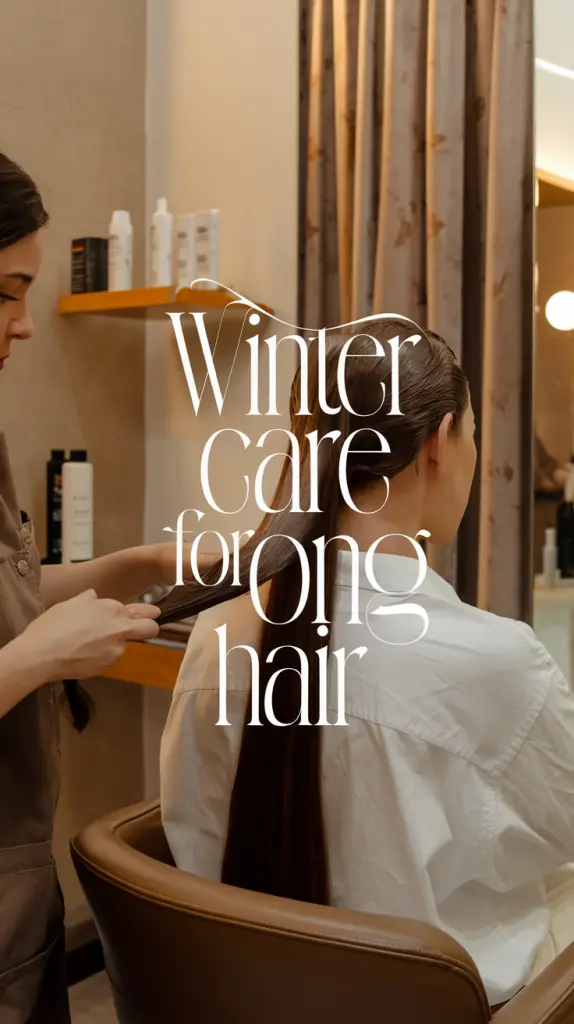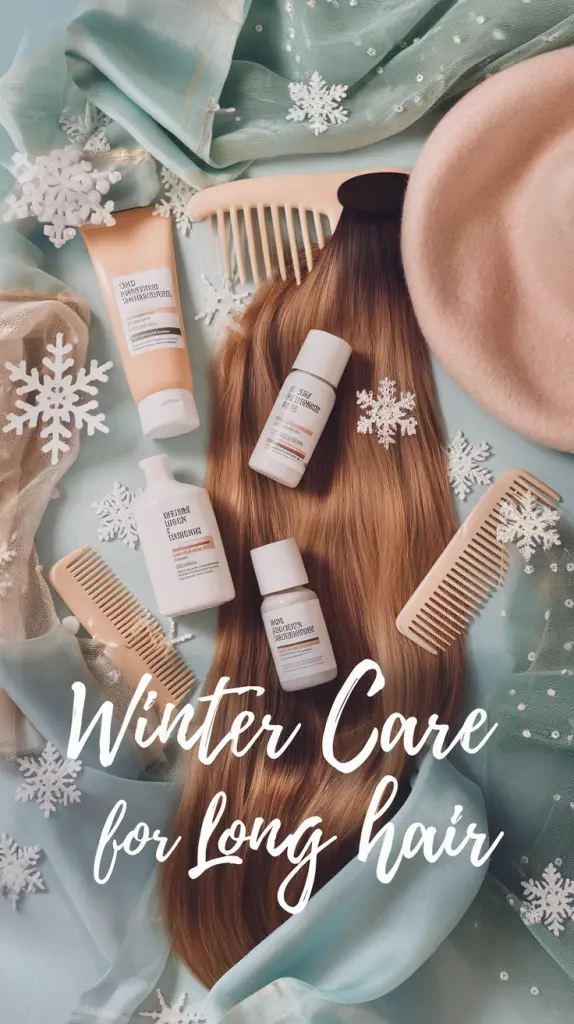Winter Care for Long Hair: Essential Tips for Healthy, Lustrous Locks
Winter can be particularly harsh on long hair. The cold, dry air and indoor heating can leave your hair feeling brittle, dry, and prone to breakage. I’ve experienced these challenges firsthand and have learned that with the right care routine, it’s possible to keep long hair looking beautiful and healthy throughout the winter months. In this article, I’ll share my personal tips and tricks to help you manage winter hair care and ensure that your locks stay nourished, vibrant, and full of life.
1. Moisturize Regularly
One of the most crucial aspects of winter hair care is ensuring that your hair stays hydrated. Cold air, combined with indoor heating, can strip moisture from your hair, leaving it dry and prone to breakage. I always make sure to use a rich, moisturizing conditioner after every shampoo and treat my hair to a deep conditioning mask at least once a week. This helps lock in moisture and keep my hair feeling soft and nourished.
Pro Tip: For a deep moisturizing treatment, look for masks that contain shea butter, argan oil, or glycerin. These ingredients are known for their ability to hydrate and restore moisture.
Moisturizing Hair Care Routine
| Step | Product Suggestions | Frequency |
|---|---|---|
| Shampoo | Sulfate-free shampoo | 2-3 times/week |
| Conditioner | Moisturizing conditioner | Every wash |
| Deep Conditioning | Shea butter or argan oil mask | Once a week |
2. Limit Heat Styling
In winter, I reduce the use of heat styling tools like blow dryers, curling irons, and straighteners. These tools can strip the hair of essential moisture, leaving it dry and brittle, especially when the air is already dry. Instead, I let my hair air dry as much as possible and, when I do use heat tools, I make sure to apply a heat protectant spray first.
Pro Tip: Opt for lower heat settings and keep the tool moving to avoid prolonged exposure to direct heat, which can further damage your hair.
3. Protect from the Elements
Winter weather can be especially damaging to long hair. Wind, snow, and the low temperatures can leave hair looking frizzy and unkempt. To protect my hair from these elements, I always wear a hat or scarf when I go outside. I prefer hats lined with silk or satin because they reduce friction and prevent my hair from becoming static or tangled.
Pro Tip: If you’re wearing a wool hat, line it with a silk scarf or choose a silk-lined hat to protect your hair from friction and minimize damage.

4. Adjust Washing Habits
In the winter, I make sure not to wash my hair too frequently, as this can strip it of its natural oils. I space out my hair washes to every two to three days, depending on my hair type. Additionally, I avoid washing my hair with hot water, as it can dry out my strands. Instead, I use lukewarm water and finish with a cool rinse to close the hair cuticles and lock in moisture.
Pro Tip: If you’re washing your hair often, consider using a dry shampoo between washes to keep your hair fresh without over-drying it.
5. Incorporate Hair Oils
During the winter, I swear by hair oils. They’re perfect for keeping my hair hydrated, smooth, and shiny. Argan oil and jojoba oil are two of my favorites because they nourish the hair without weighing it down. I apply a few drops to the ends of my hair after washing to seal in moisture and prevent split ends.
Pro Tip: Apply hair oil to damp hair for better absorption, or use it on dry hair to fight frizz and add extra shine.
6. Maintain a Healthy Diet
What I eat affects the health of my hair. During the winter, I make sure to include plenty of protein, vitamins, and healthy fats in my diet to support strong and healthy hair. Foods like eggs, citrus fruits, fatty fish, and leafy greens are excellent for promoting hair growth and ensuring my hair remains strong and shiny.
Pro Tip: Include foods high in omega-3 fatty acids, such as salmon and walnuts, to nourish your hair from the inside out.
Winter Hair-Healthy Foods
| Food Category | Examples | Benefit |
|---|---|---|
| Protein | Eggs, chicken, tofu | Supports hair growth and strength |
| Vitamins & Minerals | Citrus fruits, leafy greens | Helps prevent hair thinning and promotes shine |
| Healthy Fats | Fatty fish, walnuts | Moisturizes and nourishes hair |
7. Regular Trims
Even though winter can be a tough time for long hair, regular trims are essential. Trimming my hair every 6–8 weeks helps prevent split ends and ensures my hair stays healthy. It’s important to remove the damaged ends, as this helps your hair look fuller and more vibrant, especially during the dry winter months.
Pro Tip: If you’re growing your hair, consider scheduling a “dusting” trim to remove just the split ends without compromising length.

8. Scalp Care
In the winter, my scalp can become dry and itchy due to the cold air and indoor heating. I’ve learned that taking care of my scalp is just as important as caring for my hair. I use a gentle scalp scrub to exfoliate and remove any buildup, which helps maintain a healthy scalp and promotes hair growth. Additionally, I use scalp oils or treatments with ingredients like tea tree oil to soothe any irritation.
Pro Tip: Massaging your scalp gently while shampooing stimulates blood flow and helps distribute natural oils evenly through your hair.
9. Sleep Care
The friction between your hair and your pillowcase can lead to tangling, frizz, and split ends. I’ve found that switching to a silk or satin pillowcase has significantly improved the health of my hair. These materials reduce friction, which means less damage and smoother, shinier hair in the morning.
Pro Tip: If you don’t want to invest in a silk pillowcase, you can also wrap your hair in a silk scarf before bed to protect it.
10. Humidifier Use
Dry indoor air can exacerbate hair dryness during winter, so I use a humidifier in my bedroom to keep moisture in the air. This not only helps my skin but also keeps my hair hydrated and soft. I make sure to run it while I sleep to prevent my hair from becoming too dry overnight.
Pro Tip: Keep the humidifier at the right level to avoid excess moisture, which could cause your scalp to become oily.
11. Protective Hairstyles
One of the best ways to protect your hair during winter is by wearing protective hairstyles like braids, buns, or twists. These hairstyles keep your ends tucked away and reduce tangling, preventing unnecessary breakage. They also help reduce the need for heat styling, which is important during the dry winter months.
Pro Tip: Loose braids or buns can protect your hair while still looking stylish and chic.
12. Avoid Wet Hair Exposure
Exposing wet hair to freezing temperatures can cause it to freeze and break. I always make sure to dry my hair completely before going outside in the winter. If I do need to step out with damp hair, I cover it with a hat to protect it from the cold.
Pro Tip: If you’re in a rush and don’t have time to fully dry your hair, use a blow dryer with a heat protectant spray before stepping outside.
Conclusion
By following these simple yet effective winter hair care tips, I’ve been able to maintain long, healthy hair throughout the cold months. From moisturizing regularly to adjusting my washing habits and protecting my hair from the elements, every small change adds up to big results. Remember, winter hair care is all about consistency and listening to your hair’s needs. If you give your hair the extra love it deserves, you’ll enjoy smooth, shiny, and healthy locks all winter long.
FAQs
- How often should I deep condition my hair in winter?
- Deep condition your hair once a week for added moisture and nourishment during the winter months.
- Can I use any hair oil, or should it be specific to my hair type?
- Choose oils based on your hair type. For example, argan oil is great for dry hair, while jojoba oil works well for oily hair.
- Is it okay to wash my hair with hot water in winter?
- It’s best to use lukewarm water to avoid stripping your hair of its natural oils. Finish with a cool rinse to close the hair cuticles and lock in moisture.
- How can I prevent static in my hair during winter?
- Use a silk or satin-lined hat to reduce friction and static. Leave-in conditioner or hair oil can also help keep your hair smooth.
- Should I avoid using hair styling tools altogether in winter?
- It’s a good idea to limit heat styling, but if you must use styling tools, always apply a heat protectant spray to minimize damage.
- What are some good hair oils for winter care?
- Argan, jojoba, and coconut oils are excellent options for hydrating and protecting your hair during winter.

